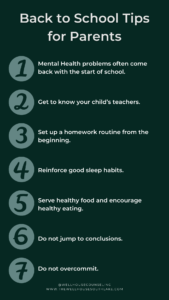7 Back to School Tips for Parents Post-Pandemic
Every child faces challenges when returning back to school. But back-to-school-time can be even more challenging for students who struggle with mental health or learning disabilities. School routines and expectations are very different from those of summer break. As the world begins to open up after COVID-19, many kids are finding themselves back in the classroom for the first time in a while. We have all felt the impact of COVID-19 restrictions. And children are no exception. It’s helpful to remember that while children are often quite resilient, they are not immune to the stresses of environmental change. As we prepare for back to school activities, you may be wondering how to help your child deal with school during COVID-19.
Seven back to school tips for parents.
 Mental Health problems often come back with the start of school.
Mental Health problems often come back with the start of school.
Summer provides a welcome respite from the hustle and expectations of the school year. The jump back into a hyper-regimented schedule is a lot to handle for anyone, but it is especially challenging for kids. Children with special needs will need extra attention to make sure they are prepared to navigate the expectations of the new school year. This will look different for each child, but often this means that a parent will need to help set up organization, study habits, school support team. In addition to setting them up for success at the beginning, keep a closer eye on them throughout the first month or so to see how they are adjusting. As the year goes on, try to touch base with them on how they are doing emotionally.
Get to know your child’s teachers.
Depending on your child’s age and maturity level, you will want to forge a connection with your child’s teachers. Teachers get to know a child’s family through the child’s eyes. They get to know how a child behaves without the parents present. You can begin by asking questions like: How is my child doing? Do you have any concerns about their social or academic skills? Do you think they need my help with anything?
If your child is older, you will want to encourage proper communication with teachers. This includes reaching out to the teachers via email and in-office hours. It’s important that your child begin building a relationship with their teacher before trouble hits. An easy way to do this is to set up a schedule where your child regularly attends tutorial hours with individual teachers. By regularly rotating through these intimate settings your child will learn the importance of relationships in academic success.
Set up a homework routine from the beginning
You can help your child adjust to the structure of a new school year by making changes to the structure and expectations at home. A dedicated after-school routine that includes time for homework is crucial. Involve your child in the planning, but once the routine is set, do not let them deviate from the plan. You will be reinforcing the importance of this routine, and everyone will benefit from the dedicated time for home studies.
Reinforce good sleep habits.
Getting plenty of rest and sleep is important not only for good grades and staying awake but also for preventing depression and other mental health issues. Establishing a reasonable bedtime routine for your child will let them know that sleep is important. This can be even more important as they get older and have additional commitments outside of school. Setting up the habit early can lead to higher rates of success as they age.
Serve healthy food and encourage healthy eating.
Food choices affect mood, ability to concentrate, and energy levels. It is important that you provide healthy balanced options for your child. Having healthy fruits and vegetables available for after-school snacks will help your child stay alert and focused as they begin their after-school activities. Learn more about your child’s nutritional needs, so you can be setting them up for success. Not only is this going to impact them today with their learning abilities, but these habits come into play later in life as well.
Don’t jump to conclusions.
Every child matures and learns at their own pace. If your child isn’t quite ready for the rigor and expectations in the classroom that is okay. Talk with teachers and administrators to understand what their goals and intentions are for students. They can give you tips and tricks to support your child as they grow into the expectations of the school year. By initiating these conversations with school staff, you will be in a good position for further intervention should your child need additional support beyond what you are able to give.
Don’t overcommit.
With so many good opportunities for extracurriculars, many families find themselves exhausted running from one activity to the next. Keep in mind the cumulative effect that each activity will have on your child. Even if your child can logistically attend all the practices and meetings, it may not be wise to spread their energies and attention across many different activities.
At the Well House Group, we see many kids who are stressed, anxious and exhausted from all their activities. Rigorous extracurriculars on top of a rigorous academic schedule is not a recipe for mental health. To know if you have overextended your obligations, you only need to look to your child for clues. Are they exhausted, anxious, or struggling to manage their responsibilities? If so, this can be a sign that they have overcommitted themselves. As a parent, it is your job to model a balanced lifestyle that includes ample time for rest and fun in addition to academic and extracurricular activities.
While these are helpful tips for all parents at the start of the year, there are some instances where these tips are not enough. If your child shows signs of extreme anxiety and has unusual difficulties in school, you should discuss your concerns with your child’s teacher as well as a mental health professional. Each of these individuals can advise on whether a child’s problems are normal and age-appropriate or require further evaluation.
How we can help you get Back to School
Our counseling services are for more than just when your child may be anxious or depressed. We have the tools here at The Well House to help with future planning, academic coaching, or to help you with what to do next as a parent. The support necessary for a whole family is important to us here. This year in particular is going to be hard for us and our kids as we navigate a world that looks completely different than it may have before. Kids are doing school online, they may not be able to play the way they used to, and new rules are abundant. School post-pandemic doesn’t have to be scary, though.
We are here to provide you with the support that your family needs, whatever that may be. Reach out to us and schedule a discussion to find out how we can help you and your children. Let’s get back to school without feeling like losing your mind. Let’s make this school year a great one.

 You might assume that this would apply only to older children and
You might assume that this would apply only to older children and  When the everyday worries that come with being a parent are too overwhelming, a counselor is a great option to relieve some of the
When the everyday worries that come with being a parent are too overwhelming, a counselor is a great option to relieve some of the  Social media and the wave of peer approval via those connections along with filters, photoshop, and impossible standards of comparison means that these children are far more susceptible to the pitfalls of depression and anxiety than ever before. According to
Social media and the wave of peer approval via those connections along with filters, photoshop, and impossible standards of comparison means that these children are far more susceptible to the pitfalls of depression and anxiety than ever before. According to